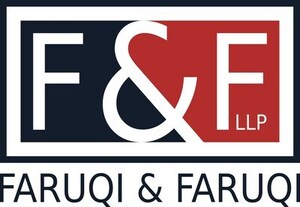NEW YORK, May 21, 2020 /PRNewswire/ -- Faruqi & Faruqi, LLP, a leading national securities law firm, reminds investors in Ryder System, Inc. ("Ryder" or the "Company") of the July 20, 2020 deadline to seek the role of lead plaintiff in a federal securities class action that has been filed against the Company.
If you invested in Ryder System stock or options between July 23, 2015 and February 13, 2020 and would like to discuss your legal rights, click here: www.faruqilaw.com/R. There is no cost or obligation to you.
You can also contact us by calling Richard Gonnello toll free at 877-247-4292 or at 212-983-9330 or by sending an e-mail to [email protected].
CONTACT:
FARUQI & FARUQI, LLP
685 Third Avenue, 26th Floor
New York, NY 10017
Attn: Richard Gonnello, Esq.
[email protected]
Telephone: (877) 247-4292 or (212) 983-9330
The lawsuit has been filed in the U.S. District Court for the Southern District of Florida on behalf of all those who purchased Ryder common stock between July 23, 2015 and February 13, 2020 (the "Class Period"). The case, Key West Police & Fire Pension Fund v. Ryder System, Inc. et al., No. 1:20-cv-22109 was filed on May 20, 2020.
The complaint alleges that Defendants inflated Ryder's financial results by systematically overstating the residual value of its trucking fleet. While Ryder repeatedly increased the expected residual values of its trucks, the actual amount Ryder was receiving from sales of used trucks had started to decline beginning in 2015. Nevertheless, the Company assured investors that it had been "conservative" in establishing the residual values of trucks in its fleet and "[w]e don't have a situation where we've got a bunch of vehicles that are at high residual values [and] have to be written down." As a result of Defendants' misrepresentations, shares of Ryder's common stock traded at artificially inflated prices during the Class Period.
On July 30, 2019, the Company reported earnings before tax for the second quarter of 2019 in its FMS business segment of $57.7 million compared to $76.6 million the prior year period, driven by lower used vehicle sales results which had declined from the prior year as a result of higher valuation adjustments of $10.4 million on a larger inventory and higher depreciation of $7.6 million due to residual value changes. As a result, Ryder reduced its earnings per share forecast for 2019 to a range of $4.80 to $5.10, as compared to its prior forecasted range of $5.28 to $5.58. Although the Company did not quantify the impact of used vehicle prices on its 2019 outlook, management indicated that the majority of the lowered guidance reflected weaker tractor valuations.
On this news, the Company's stock price fell from $59.32 per share on July 29, 2019 to $53.38 per share on July 30, 2019: a $5.94 or 10.01% drop.
On October 29, 2019, the Company disclosed to investors that "management concluded that our residual value estimates likely exceeded the expected future values that would be realized upon the sale of power vehicles in our fleet." As a result, Ryder significantly lowered the residual value estimates for all vehicles and incurred $177 million in additional depreciation expense in the third quarter of 2019.
On this news, the Company's stock price fell, over two trading days, from $55.12 per share on October 28, 2019 to $48.44 per share on October 30, 2019: a $6.68 or 12.12% drop.
Then, on February 13, 2020, during the trading day, Ryder reported that, based on the significant reductions to the residual value of its fleet, it had incurred a total of $357 million in additional depreciation expense for 2019 plus a loss of approximately $58 million on the sale of used vehicles. The Company also announced that, for 2020, it expected to incur another $275 million in depreciation charges on its trucking fleet plus an additional $20 million estimated loss on used vehicle sales. In response to these disclosures, Ryder's stock price declined 20% over two trading days, from $50.19 per share to $40.12 per share.
On this news, the Company's stock price fell, over two trading days, from $50.19 per share on February 12, 2020 to $40.12 per share on February 14, 2020: a $10.07 or 20.07% drop.
The court-appointed lead plaintiff is the investor with the largest financial interest in the relief sought by the class who is adequate and typical of class members who directs and oversees the litigation on behalf of the putative class. Any member of the putative class may move the Court to serve as lead plaintiff through counsel of their choice, or may choose to do nothing and remain an absent class member. Your ability to share in any recovery is not affected by the decision to serve as a lead plaintiff or not.
Faruqi & Faruqi, LLP also encourages anyone with information regarding Ryder's conduct to contact the firm, including whistleblowers, former employees, shareholders and others.
Attorney Advertising. The law firm responsible for this advertisement is Faruqi & Faruqi, LLP (www.faruqilaw.com). Prior results do not guarantee or predict a similar outcome with respect to any future matter. We welcome the opportunity to discuss your particular case. All communications will be treated in a confidential manner.
SOURCE Faruqi & Faruqi, LLP

Related Links
WANT YOUR COMPANY'S NEWS FEATURED ON PRNEWSWIRE.COM?
Newsrooms &
Influencers
Digital Media
Outlets
Journalists
Opted In


Share this article